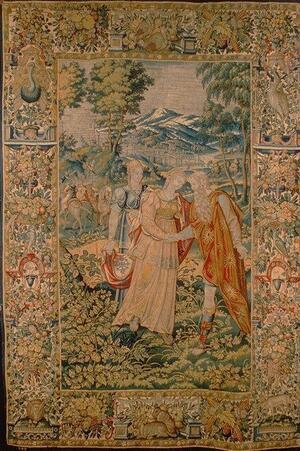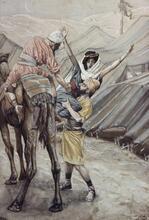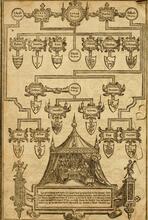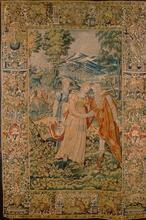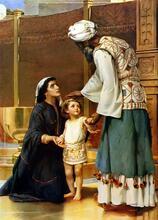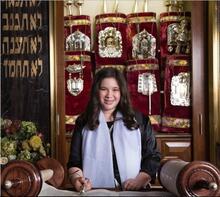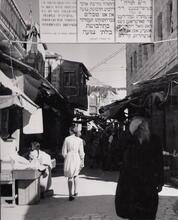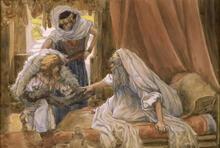Bilhah: Bible
Bilhah is given by Laban to Rachel as a gift when she marries Jacob. Rachel in turn gives Bilhah to Jacob as a “wife” when Rachel is found to be barren. Though her reaction is not recorded, Bilhah gives birth to two sons, Dan and Naphtali, who are named by Rachel but referred to as “the sons of Bilhah.” Later in her life, Bilhah would have sex with Reuben, Jacob’s eldest son. In later texts, Bilhah is remembered as one of the ancestresses of the Israelites.
Bilhah and Rachel
When Rachel marries Jacob, her father Laban gives her a maid, Bilhah (Gen 29:29; 46:25), whom she gives to Jacob as a wife (Hebrew ishah) when she finds herself barren (Gen 30:3–7). Rachel did not have to do this for Jacob’s sake, for Jacob already had children to be his heirs by his other wife, Leah; rather, she is said to do this so that Jacob could fulfill her demand to give her children. Rachel plans to “have children through her” (as Sarah did with Hagar) by having Bilhah give birth “upon my [Rachel’s] knees,” probably a phrase that comes from adoption ritual. The story is silent about Bilhah’s reaction. The plan succeeds, so that when Bilhah’s son is born, Rachel names him, an act expressing her maternal authority. The child’s name, Dan, means “he judged” and indicates Rachel’s relationship to the boy: she claims that “God has judged me [Hebrew dananni] and has also heard my voice and given me a son” (Gen 30:6). Bilhah bears another son to Jacob under this arrangement, with Rachel again naming the child. She calls him Naphtali, which means “I have prevailed,” because she has “prevailed” (Hebrew niftalti) over her sister in a divine contest (Hebrew naftulei Elohim; NRSV, “mighty wrestlings”).
Despite this relationship to Rachel, Dan and Naphtali continue to be considered Bilhah’s sons, and that influences their standing in the family. When faced with what he thinks might be a tense confrontation with his brother, Esau, Jacob places the “two maids and their children” at the front of his household, Leah and her children next, and Rachel and Joseph bringing up the (protected) rear (Gen 33:1–3; compare 32:22–23).
Status as Wife or Maid?
Bilhah’s own status in the household is somewhat ambiguous. She is given to Jacob as his “wife” (Hebrew ishah), although in one instance she is called his “secondary wife” (pilegesh; NRSV, “concubine”). Yet in the potentially dangerous situation with Esau, she reverts to being called a “maid” (Hebrew shifhah). Furthermore, in the listing of Jacob’s twelve sons in chap. 35, Dan and Naphtali are presented as the “sons of Bilhah, Rachel’s maid” (v. 25). And the maids apparently must share a tent, whereas the wives have their own (Gen 31:33). Nevertheless, when the danger from Esau has passed, Bilhah again is called Jacob’s wife; and her sons are not disadvantaged, for Rachel’s biological son Joseph becomes a shepherd, “a helper to the sons of Bilhah and Zilpah, his father’s wives” (Gen 37:2).
Bilhah must have been very young when she bore her children, because Jacob’s eldest son Reuben (by Leah) has sex with her (Gen 35:22). Sleeping with one’s father’s wife was considered a great offense in biblical law (Lev 18:8; 20:11); perhaps that is why Bilhah is called his secondary wife (pilegesh) in this one text—to diminish the gravity of the act. Jacob hears about what Reuben did and does nothing at the time. But apparently he considered it a major offense, for in his deathbed speech, he removes Reuben from his extra inheritance as firstborn and alludes to Reuben’s dreadful deed (Gen 49:4).
Nothing is said about Bilhah’s fate, but she continued to be remembered as the ancestress of major clans in Israel (1 Chr 7:13).
Meyers, Carol, General Editor. Women in Scripture. New York: 2000.

